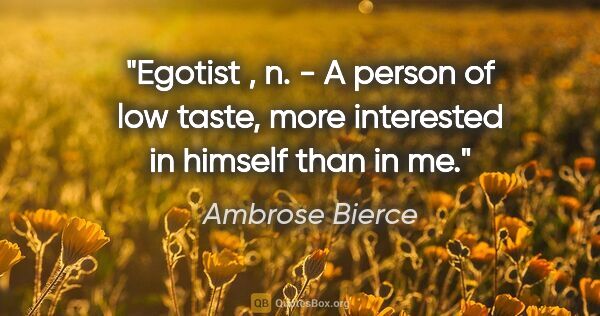Tasteful Quotes (page 24)
...the lovable is not scarce- it is everywhere. Everything you touch is lovable. There is a hufe surplus, a thousand wonderful things to do, see, feel, taste and smell and a million wonderful people to respond to, talk to, do things for, and delight in, ideas to play with, skills to learn, pictures to paint, songs to sing, grass to mow, poems to write, food to cook and dishes to wash. Each of these is one more occasion to love, out of countless such.
Frank Adams
O smile, going where? O upturned look:
new, warm, receding surge of the heart--;
alas, we are that surge. Does then the
cosmic space
we dissolve in taste of us? Do the
angels
reclaim only what is theirs, their own
outstreamed existence,
or sometimes, by accident, does a bit
of us
get mixed in? Are we blended in their
features
like the slight vagueness that
complicates the...
Rainer Maria Rilke

North Korea is a famine state. In the fields, you can see people picking up loose grains of rice and kernels of corn, gleaning every scrap. They look pinched and exhausted. In the few, dingy restaurants in the city, and even in the few modern hotels, you can read the Pyongyang Times through the soup, or the tea, or the coffee. Morsels of inexplicable fat or gristle are served as 'duck.' One evening I gave in and tried a bowl of dog stew, which at least tasted hearty and spicy—they wouldn't...
Christopher Hitchens
All that you touch All that you see All that you taste All you feel. All that you love All that you hate All you distrust All you save. All that you give All that you deal All that you buy, beg, borrow or steal. All you create All you destroy All that you do All that you say. All that you eat And everyone you meet All that you slight And everyone you fight. All that is now All that is gone All that's to come and everything under the sun is in tune but the sun is eclipsed by the moon. "There...
Roger Waters
What I didn’t yet understand was the importance of taste and timing. Books are like people. Some look deceptively attractive from a distance, some deceptively unappealing; some are easy company, some demand hard work that isn’t guaranteed to pay off. Some become friends and say friends for life. Some change in our absence — or perhaps it is we who change in theirs — and we meet up again only to find that we don’t get along any more.
Mark Haddon
At last everything was satisfactorily arranged, and I could not help admiring the setting: these mingled touches betrayed on a small scale the inspiration of a poet, the research of a scientist, the good taste of an artist, the gourmet’s fondness for good food, and the love of flowers, which concealed in their delicate shadows a hint of the love of women
August Strindberg
I call it Joy, which is here a technical term and must be sharply distinguished both from Happiness and Pleasure. Joy (in my sense) has indeed one characteristic, and one only, in common with them; the fact that anyone who has experienced it will want it again... I doubt whether anyone who has tasted it would ever, if both were in his power, exchange it for all the pleasures in the world. But then Joy is never in our power and Pleasure often is.
C. S. Lewis
This philistinism of interpretation is more rife in literature than in any other art. For decades now, literary critics have understood it to be their task to translate the elements of the poem or play or novel or story into something else. Sometimes a writer will be so uneasy before the naked power of his art that he will install within the work itself - albeit with a little shyness, a touch of the good taste of irony - the clear and explicit interpretation of it. Thomas Mann is an example...
Susan Sontag
We fall in love because we long to escape from ourselves with someone as beautiful, intelligent, and witty as we are ugly, stupid, and dull. But what if such a perfect being should one day turn around and decide they will love us back? We can only be somewhat shocked-how can they be as wonderful as we had hoped when they have the bad taste to approve of someone like us?
Alain de Botton
The aesthetic event is something as evident, as immediate, as indefinable as love, the taste of fruit, as water. We feel poetry as we feel the closeness of a woman, or as we feel a mountain or a bay. If we feel it immediately, why dilute it further with words, which no doubt will be weaker than our feelings?
Jorge Luis Borges

